Review of Verdi: I Due Foscari (Gavazzeni)
Introduction
This BBC Opus Arte release is part seven in its mid-price range of classic operatic performances and is a piece that`s been lurking in RAI`s (Italian TV station) archives since its original broadcast in 1988. It features a performance of Verdi`s `I Due Foscari` by the `Teatro Alla Scala`, one of the world`s greatest opera houses.
Clocking in at just under two hours it`s a piece that can be easily enjoyed in a single sitting. Gianandrea Gavazzeni (here enjoying his 79th year) conducts and directs this early opera from Verdi, originally written and staged in 1844. It`s one of the more popular of Verdi`s operas, based on a drama entitled `The Two Foscari`s`, penned by Lord Byron, set in Venice in the 15th Century.
This three act operatic tragedy is sung in Italian with serviceable subtitles to aid those of us unable to follow the action without.
The two principal roles are played by Renato Bruson (Francesco Foscari) and Alberto Cupida (Jacopo Foscari), whilst Lucrezia Contarini (wife of Jacopo) is played by Linda Roark-Strummer.
The theatrical setting is very impressive. The La Scala is a fantastic building both inside and out, with some six storeys of `stalls` over looking the traditional proscenium arch of the theatre.
The first act is an emotional roller coaster which sees the return of Jaocopo to Venice following exile in Greece. He is set to face new charges, and his Father, as the Doge, to show that there is no favouritism and that the law is impartial, sentences Jacopo to exile once more as the evidence against him seems sound. Despite emotional pleadings from Lucrezia, and his own sadness at the verdict, he is resolute. The scene is therefore set for the greatest tragedy of all - a Father set to condemn the life of his own son.
Act 2 starts with Jacopo having a nightmarish vision in his prison cell of the ghost of Carmagnola, a commander executed in Venice. When he wakes from his faint, Lucrezia informs him that he has been sentenced and they will have to live apart forever. Lucrezia pleads with the counsellors, bringing her own children to the court, but the council are immovable. Jacopo realises that he must leave for Crete alone.
Act 3 opens with a colourful gathering of townsfolk looking forward to a regatta which is interrupted by the arrival a galley arriving amidst blaring trumpets, that is set to take Jacopo away. When all looks lost (with great emotion and tears from all the family) news arrives in that another has confessed to the crime of which Jacopo is accused. Just as Renato (the father) thanks the heavens for this change in fortune, Lucrezia arrives to inform him that Jacopo has died of heartbreak as the boat left port. In true tragic form, the opera concludes with a broken Renato being informed that he is no longer suitable to be the Doge, and the shock brings about his untimely demise too.
Whilst the opera is overflowing with emotion, this is not a feel-good narrative, though provides the framework for some very highly charged performances.

Video
This was originally a television broadcast so the picture reflects that. However, it`s a nice job the picture is generally sharp and colour balance is good throughout, often a failing with `theatre to television` pieces.
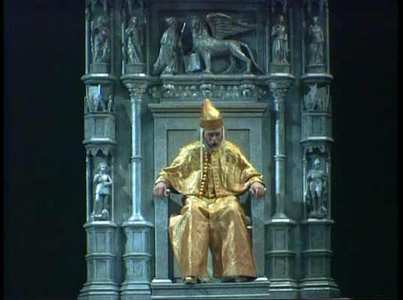
Audio
This an expertly recorded soundtrack, perfectly mixed and getting the very best from orchestra and performers alike. During quiet passages you can hear the occasional audience cough or murmur but this just adds to the general `night at the opera` feel. It`s a fairly standard stereo mix with most the action coming straight out the centre - which for theatre of this type and in this setting is exactly as it should be.
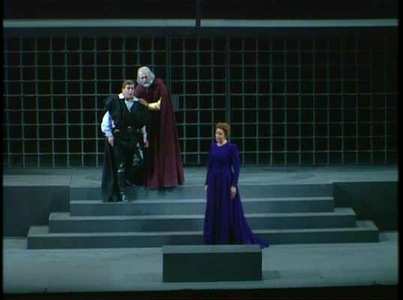
Features
No extras other than a 20-page booklet with full libretto by Francesco Maria Piave, should you want to sing along on occasion.
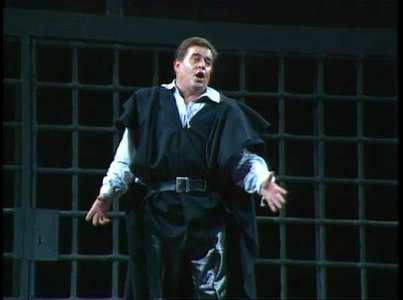
Conclusion
This really is opera on a grand scale with virtuoso performances from some of Italy`s finest, all recorded at one of Italy`s finest opera houses, the Teatro alla Scala in Milan. The BBC Opera Arte crowd are certainly on a mission, unearthing all sorts of hidden gems for the delectation of opera-loving audiences. This find is no exception, originally broadcast in Italy on RAI in 1988, and will surely thrill lovers of this early opera from Verdi.
The camerawork and direction is sensibly and intuitively handled throughout to maximise the enjoyment of what is essentially a theatrical performance captured on video. For fans of the opera this must represent the next best thing to being there - and all for a fraction of the price of a couple of tickets too.
For someone like myself, who has little or no interest in opera, I found it strangely tolerable, occasionally moving and actually quite enjoyable. Between the heavy drama (with its heavy orchestral accompaniment) there are moments of real beauty with reflective pieces that feature melodies that are easy to like on a first-listen. There`s nothing `difficult` or purposefully highbrow about this performance.
The stage-set is elegantly simple throughout, with either black backdrop or stairs leading to a castle-shaped throne - or variations thereof.
Lucrezia`s pieces are positively glass-shattering on occasion and I was left with the over-riding feeling that this was the real McCoy, though I hardly feel qualified to say so. If the flowers that are thrown in abundance on the principals at the end of the performance are anything to go by, then the audience seemed to enjoy it.
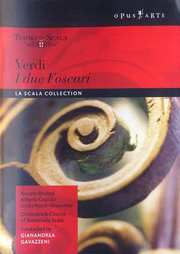
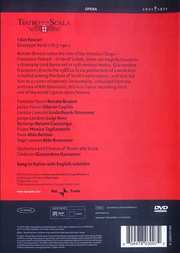
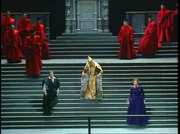



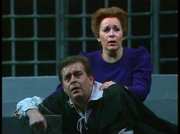
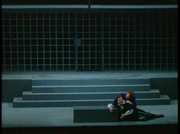
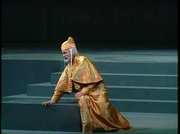
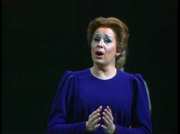
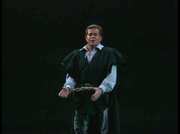
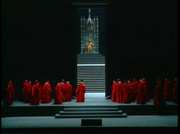
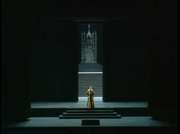
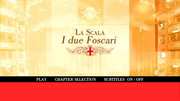






























Your Opinions and Comments
Be the first to post a comment!